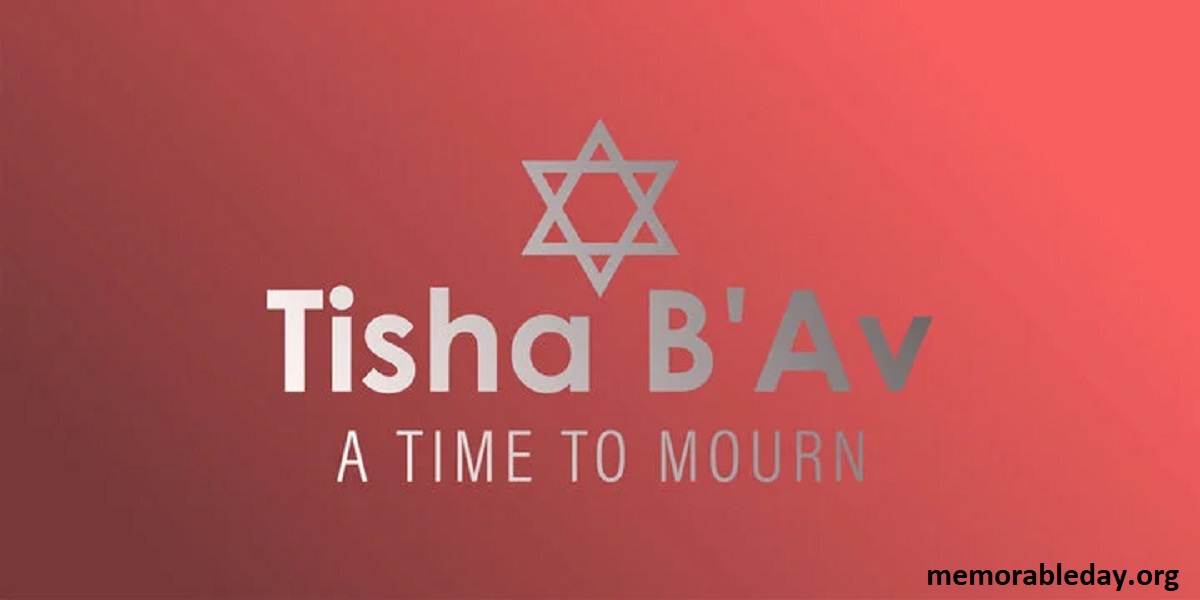
Firstly, Tisha B’Av, the ninth day of the Hebrew month of Av, is a day of mourning in the Jewish calendar. Essentially, it commemorates a series of tragic events in Jewish history, most notably the destruction of both the First and Second Temples in Jerusalem. Therefore, it is observed as a fast day, a time for introspection, and a period of communal grief. Moreover, it’s a time to reflect on the causes of these tragedies and to work towards repairing the world.
History of Tisha B’Av
Historically, Tisha B’Av marks a day of profound sorrow. Initially, the destruction of the First Temple by the Babylonians in 586 BCE and the Second Temple by the Romans in 70 CE are the primary events commemorated. Additionally, other calamities, such as the expulsion of Jews from Spain in 1492, are also associated with this date. Consequently, Tisha B’Av has become a symbol of Jewish suffering throughout the ages. Furthermore, it serves as a reminder of the fragility of Jewish existence and the importance of unity.
Also Read: National Vinyl Record Day
When is Tisha B’Av Celebrated?
Specifically, Tisha B’Av occurs on the ninth day of the Hebrew month of Av. Thus, in 2024, it begins at sundown on Saturday, August 10th and concludes at nightfall on Sunday, August 11th. However, because the jewish day starts at sundown, the date that many people refer to is Sunday August 11th. In contrast, in 2024, if you say “Celebrate Tisha B’Av August 12th.” that would be incorrect. Ultimately, the date changes each year according to the Hebrew calendar.
How We Celebrate Tisha B’Av
Primarily, Tisha B’Av is observed with a 25-hour fast, abstaining from food and drink. Furthermore, other restrictions include refraining from bathing, wearing leather shoes, and engaging in pleasurable activities. Moreover, synagogues hold special services, during which the Book of Lamentations (Eicha) is read aloud. Indeed, many people sit on low stools or the floor, symbolizing mourning. Additionally, the atmosphere is somber, with prayers focusing on repentance and the restoration of Jerusalem.
Why is Tisha B’Av Celebrated?
Essentially, Tisha B’Av is observed to remember and mourn the destruction of the Temples and other historical tragedies. Moreover, it serves as a time for self-reflection and acknowledging the sins that led to these calamities. Therefore, it encourages introspection and a commitment to improving oneself and the world. Ultimately, the goal is to learn from the past and work towards a future of peace and unity.
Celebrate Tisha B’Av August 11th (2024)
Certainly, while the date shifts annually, in 2024, Tisha B’Av begins at sundown on August 10th and extends through August 11th. Therefore, observing the day involves adhering to the traditional customs of fasting, mourning, and reflection. Moreover, participating in synagogue services and reading Lamentations are central to the observance. Thus, it’s a time to connect with Jewish history and reaffirm the commitment to a better future.
Tisha B’Av Quotes
- “For Zion’s sake I will not keep silent, for Jerusalem’s sake I will not remain quiet.”
- “The broken heart is the best of all the instruments. Can you hear its sound?”
- “Even in destruction, there is a seed of redemption.”
- “Mourning is not an end, but a path to healing.”
- “Through tears, we find strength.”
- “Remembering the past is a duty to the future.”
- “In our sorrow, we find unity.”
- “Lamentations teach us the cost of division.”
- “From the depths of despair, hope can arise.”
- “The pain of the past calls us to mend the present.”
- “In mourning, we find the seeds of rebuilding.”
- “A broken world needs a compassionate heart.”
- “Through remembrance, we honor the past and shape the future.”
- “Tisha B’Av reminds us to strive for peace.”
- “Even in darkness, the light of hope remains.”
- “Our tears are a testament to our resilience.”
- “From ashes, we rise again.”
- “The pain of loss strengthens our resolve.”
- “In our collective grief, we find strength.”
- “Tisha B’Av: a time to remember, reflect, and rebuild.”
Tisha B’Av Wishes
- May we find strength in our shared mourning.
- May our reflections lead to positive change.
- May we remember the past and work towards a brighter future.
- May this Tisha B’Av bring us closer to unity.
- May our prayers for Jerusalem be answered.
- May we find comfort in our community.
- May our introspection bring us closer to redemption.
- May we learn from the lessons of the past.
- May our hearts be filled with hope and resilience.
- May we strive for peace and understanding.
- May we remember the tragedies with solemnity and respect.
- May our mourning lead to healing and growth.
- May we find strength in our shared history.
- May this day of reflection inspire us to be better.
- May we find solace in our faith.
- May our prayers for a better world be heard.
- May we emerge from this day stronger and more united.
- May our memories inspire us to create a better future.
- May we find peace and comfort during this solemn time.
- May this Tisha B’Av be a time of meaningful reflection.
Tisha B’Av Greetings
- Wishing you strength during this solemn time.
- May you find comfort and reflection this Tisha B’Av.
- Thinking of you during this day of mourning.
- May this Tisha B’Av be a time of meaningful reflection.
- Wishing you peace and introspection.
- May you find solace in your faith and community.
- Sending you strength and prayers on Tisha B’Av.
- May this day bring you closer to understanding and healing.
- Thinking of you as we remember and mourn.
- May this Tisha B’Av be a time of deep reflection.
- Wishing you a meaningful observance.
- May your prayers be heard and your heart be comforted.
- May this day bring you closer to your community.
- Wishing you strength and resilience during this time.
- May this Tisha B’Av bring you peace.
- Thinking of you during this day of remembrance.
- May you find comfort in your memories and faith.
- Wishing you a time of reflection and renewal.
- May this Tisha B’Av be a time of meaningful introspection.
- Sending you thoughts of comfort and peace.
Tisha B’Av Messages
- May we remember the past and strive for a better future.
- Let us reflect on the lessons of history this Tisha B’Av.
- May our mourning lead to healing and unity.
- Let us remember the tragedies with solemnity and respect.
- May this day bring us closer to understanding and peace.
- May our prayers for Jerusalem be answered.
- Let us find strength in our shared history and faith.
- May this Tisha B’Av be a time of deep introspection.
- Let us remember and learn from the past to build a better future.
- May our collective mourning bring us closer together.
- Let us reflect on the importance of unity and compassion.
- May this day inspire us to be better individuals and a stronger community.
- Let us remember the sacrifices made and honor their memory.
- May our prayers for peace and understanding be heard.
- Let us find comfort in our faith and support each other.
- May this Tisha B’Av be a time of meaningful remembrance.
- Let us strive to create a world free from hatred and division.
- May our reflections lead to positive change and growth.
- Let us honor the past and work towards a brighter future.
- May this day of mourning bring us closer to redemption.
Celebrate Tisha B’Av FAQs and answer
1. What is Tisha B’Av?
Tisha B’Av (the 9th of Av) is a fast day commemorating the destruction of both the First and Second Temples in Jerusalem, as well as other calamities that have befallen the Jewish people throughout history.
2. When is Tisha B’Av observed?
Tisha B’Av falls on the 9th day of the Hebrew month of Av. If the date falls on Shabbat, the observance is postponed to the 10th of Av.
3. What events are mourned on Tisha B’Av?
Some major tragedies commemorated on Tisha B’Av include:
- The destruction of the First Temple (586 BCE) by the Babylonians.
- The destruction of the Second Temple (70 CE) by the Romans.
- The expulsion of Jews from Spain in 1492.
- The start of World War I (1914), which led to significant hardships for Jews.
4. How is Tisha B’Av observed?
- Fasting: It is a 25-hour fast, similar to Yom Kippur, from sunset to nightfall.
- Mourning Customs: No bathing, no wearing leather shoes, and no engaging in pleasurable activities.
- Reading the Book of Lamentations: The biblical book of Eicha (Lamentations) is read in synagogues.
- Avoiding Greetings and Joyful Activities: People refrain from casual greetings and entertainment.
5. Can work be done on Tisha B’Av?
Many people refrain from working, especially during the first half of the day, to focus on mourning. However, those who must work may do so if necessary.
6. Are there any exceptions to fasting?
Yes, those who are ill, pregnant, nursing, or otherwise unable to fast for health reasons may be exempt. They should consult a rabbi for guidance.
7. How does Tisha B’Av end?
After nightfall, the fast is broken, and mourning restrictions are lifted gradually. Some customs, such as refraining from eating meat or drinking wine, continue until midday on the 10th of Av.
Would you like more details on any aspect of Tisha B’Av?






